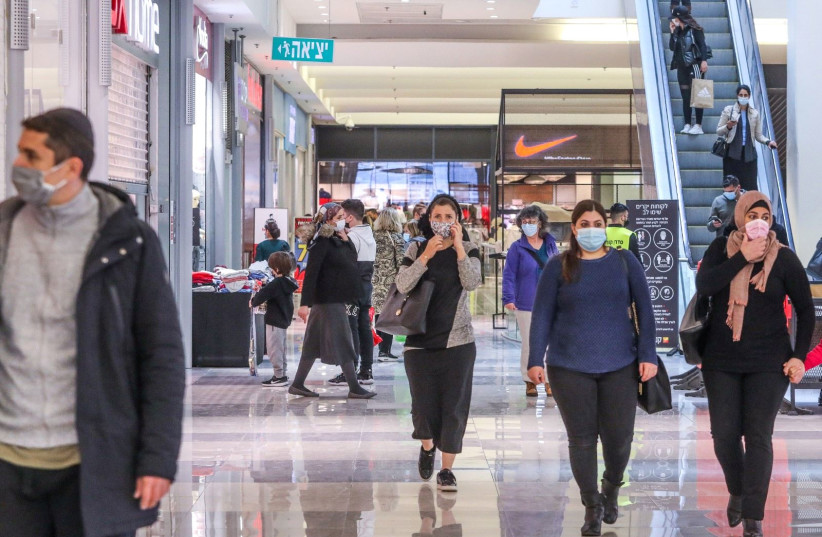Some 229 new cases were reported on Friday * Coronavirus cabinet is expected to meet on Sunday

(photo credit: MARC ISRAEL SELLEM)
The coronavirus cabinet is expected to meet on Sunday to discuss the next steps for managing the increasing number of COVID-19 cases in the country, after the government on Friday restored the obligation of wearing masks indoors and in crowded spaces.
The cabinet is reportedly considering the following additional restrictions: requiring citizens to wear masks in open spaces, reducing the number of people allowed to gather and testing unvaccinated individuals before allowing them to take part in certain activities.
However, Health Minister Nitzan Horowitz said that he is not planning to roll out any new restrictions. Rather, he said he would focus on previously announced efforts, such as requiring fines of at least NIS 5,000 on anyone who breaks isolation, as well as stepping up enforcement of testing and against restricted travel at the airport.
“Of course, we will take steps in accordance with the situation,” he said during an interview with Meet the Press over the weekend. He also noted that the effectiveness of the current steps was meant to be evaluated before the government rolls out tougher restrictions – if they are needed – which he said “is not my goal.”
There were 229 new cases reported on Friday, according to a Saturday night update by the Health Ministry. For most of June, Israel only registered between 3 and 30 new daily cases, but at the beginning of last week the cases started to increase following several outbreaks in schools. Even so, there are only 26 people in serious condition. At the peak of the pandemic, Israel registered thousands of new cases every day and had some 1,200 patients in serious conditions.
Assuming that this next wave of COVID-19 in Israel includes only a minor to moderate increase in serious cases, the Israeli government is faced with two choices: leave the economy open and accept a certain death toll from the virus or work to eradicate it altogether, according to Prof. Eran Segal, a computational biologist at the Weizmann Institute of Science.
“This is a policy decision, and therefore a decision that only a government can take,” he said.
Segal has been tracking coronavirus since its onset and consults with the coronavirus cabinet. In an interview with N12 on Saturday night, he noted that this was the key question the government would have to consider at its coronavirus cabinet meeting on Sunday.
On Friday, he laid out what he believes to be the situation in Israel through a series of tweets, in which he said that Pfizer’s vaccine is effective against preventing serious illness from the Delta variant – and that in Israel, which leads the world in the percentage of its population to be fully vaccinated, there has still not been an increase in serious cases.
“Delta has been in Israel for two months and has not immediately led to a surge, so the recent increase may still be due to a number of ‘superspreading’ events that will not lead to an uncontrolled surge,” Segal tweeted. “We still don’t know.”
The majority of outbreaks have been in the country’s schools and Segal recommended vaccinating as many kids as possible between the ages of 12 and 15 years old, which he said could “put Israel back at the threshold of herd immunity, if Delta indeed took us out of it.”
Over the weekend, the Health Ministry launched a new campaign targeted at encouraging these teens to get the jab. Maccabi alone reported an expected 30% increase in teen vaccination this week.
The school year is set to close at the end of the month, but most students are continuing on for several weeks to make up for some school days lost during the pandemic.
There were 332 students infected with coronavirus as of Thursday, the Education Ministry reported, as well as 32 teachers.
According to the new directive, masks must be now worn in all indoor spaces other than a permanent living space. The only exemptions are for children under the age of seven, someone who cannot wear a mask due to a mental or physical disability, those who are alone or with their office mate, or those who are exercising.
The Health Ministry also requested that people wear masks in crowded spaces.
As reported by The Jerusalem Post
